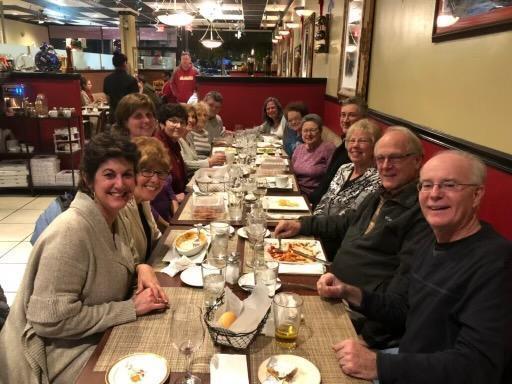
After losing her husband in 2017, Shari Berman was in what she describes as “a bad place” and needed support. Her friend Jennifer DeAngelis asked what the best way to help would be. And Berman, like DeAngelis a member of Congregation Beth Emeth in Herndon, said she needed to meet other people who were in a similar place as she was.
Out of that need came the Conservative synagogue’s widow and widower support group, sponsored by the Pozez Jewish Community Center of Northern Virginia.
“I wanted to really connect with people who were in the same kind of pain of losing a spouse, which is very different than losing a parent, or grandparent or sibling, child, or friend,” Berman, who is also the Pozez JCC’s adult education director, said recently.
Losing a loved one is one of the most challenging things a person will face. But for 20 group members, grief and emotional support can be shared.
“We say it’s a club that nobody wants to be in but we’re glad you’re here,” Berman said.
At each meeting, members talk about the highs and lows they experienced since they were last together.
Dr. Rebecca Fleischer, a licensed clinical psychologist, has been the Pozez JCC’s facilitator with the group since its inception. She said did not think she would still be working with the group almost five years later; she didn’t recognize the need for this kind of support.
“This community support is huge, especially in the beginning,” Fleischer said. “So many of them question why they’re feeling what they’re feeling and why they’re experiencing what they’re experiencing. To get that kind of validation is really healing.”
What began as a monthly session evolved into members coordinating their own weekly meetups at restaurants — and over Zoom during the brunt of the COVID-19 pandemic.
Bobbie Cohen’s husband died in 2014. She joined the group in 2017 and called it “a lifeline” to each other.
“It’s amazing in a way, because this group has become very close, much like a family,” Cohen said. “What we discovered is that even if your spouse or partner passed away years ago or recently, you have the support of the others in that group. Because, unfortunately, everyone has been through it.”
Members of the group have gone on picnics and to concerts with each other. About 15 people had lunch together on Valentine’s Day at Silver Diner in Merrifield, Va.
For Cohen, 80, one of her friendships in the group developed into something much deeper. After fellow attendee Nelson Milder mentioned he really needed to be around people since he lost his wife, he suggested the group get together and have brunch. While Cohen and Milder enjoyed the company of the whole group, they began dating and have now been living together for two years.
Making friendships and learning to live their lives even after the death of their spouses has been a huge benefit, according to Milder, 86.
“We all feel that’s what our partners would have wanted for us,” said Milder, who lives in Burke. “I know that my wife mentioned that to me before she passed. Most of the people who lost loved ones were told by their loved ones that they wanted their partners to exist and go on to make a life for themselves.”
Milder said there have been a few male members who came to the group on a whim, and initially could not speak because their loss was so great.
“But now they’re very much participants of this group and are starting to see a more positive future for themselves,” Milder said. “And it’s made a big difference in their mental state. They’ve gone from extreme sadness to feeling the need to doing things to enhance their lives.”
One of these men is Don Moyer of Reston, who joined a month after his wife died in 2018. Moyer knew he needed to be around people who were grieving, too.
“I remember walking to the room for the first time, panicking, and walking out to go to the bathroom to compose myself,” said Moyer, 56. “Which is completely unusual for me because I am pretty much composed all the time. But I was just terrified. And it suddenly occurred to me that I belonged in this group.
“These were complete strangers,” Moyer continued. “I didn’t know any of these people before I joined. These people have had the same experience that I’ve had, they talk about their loss in the same way and they are struggling for answers the same way that I was.”
Fleischer said there are good days and bad days when it comes to grieving. Milestones such as anniversaries, birthdays and holidays can be tough. She said talking about one’s significant other is important, despite how hard the process may be sometimes.
“There’s no one way to grieve,” Fleischer said. “There’s no right or wrong way. There’s no proper timetable. Everybody is on the path and, unfortunately, kind of has to figure it out. But we know that that support helps, that not ignoring your feelings helps, that you have to feel, even when it feels really, really bad.”







What is the average age of the Nova group?
When and where are the meetings held?
I never was aware this existed, but glad I was made aware of it.